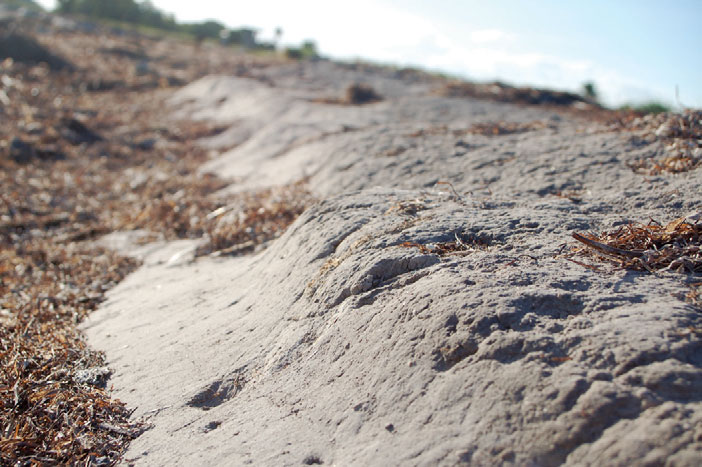Let's Talk Dirty: S. Florida Soils
Anyone who’s ever put shovel to Earth here knows that our “soil” is actually rock, a type of limestone known as Miami Limestone, not coral.
South Florida soils are a mixture of some sand, some marl (weathered limestone) and a lot of Miami Limestone, which is alkaline with a pH of about 7.8-8.4. The limestone does not hold water or nutrients well. The high pH is the most troublesome characteristic of our soil because it makes it difficult or impossible for many of our plants to get some of the micro-elements they need. It’s necessary to apply micro-nutrients such as boron and zinc using a foliar spray or, in the case of iron, a chelated form that is mixed with water and poured over the plant’s roots. These fertilizing tricks help to get our plants what they need despite the high pH.
It’s actually a good thing that our soils don’t hold water well when we factor in heavy summer rainfall. Soils with high water-holding capacity would undoubtedly result in massive flooding. Unfortunately, when soils don’t hold water well, they usually don’t hold nutrients well, either. We need to use slow-release fertilizers and as much mulch as possible so nutrients are not lost with every passing rainstorm.
ADD ORGANIC MATTER Mulch and compost are your best bet to battle our rocky soils. Mulch will not only beautify your landscape and help discourage weeds, it will also slowly decompose to create an organic layer of soil in your garden. Compost also helps because it has already decomposed and can immediately begin to feed your plants.
Amending a new planting hole with “good soil” is not recommended. This can create a container effect and keep your new planting’s roots from moving out into the native soil. When you plant a new tree or shrub, dig the hole slightly bigger than the root ball and use the same soil you pull out of the hole. Planting the tree at the correct level is extremely important. Roots should be underground and the trunk should be above ground.
Many species of plants do quite well in our poor soil, including tropical fruit such as mangos, sapodillas and avocados. Lychees, longans, carambolas and mameys have a harder time and benefit from a fertilizer program that includes foliar sprays of micro-elements and an iron drench at least twice a year during the rainy months.
RECIPE FOR GOOD SOIL
When growing things in containers, you can control the type of soil you use. A good soil will drain well, hold nutrients, allow aeration in the root zone and provide support for your plant. To get all four, a good mix contains some sand, some peat and some perlite, depending on how aerated you would like the soil.
Because of our poor soil, vegetables are usually grown in raised beds. A nice-sized raised bed is 4’ X 8’ and at least 12” high. Use a good mix that will hold water and nutrients, but still have good aeration. To check if your soil mix has enough aeration, grab a handful of the soil in your hand and make a tight fist. If the soil stays in a ball when you open up your hand, then the aeration is poor. If the soil falls apart, then the soil has good aeration.
The best way to combat our poor soils is through plant choice. The right plant in the right place is always the first step in choosing what you will grow. But you can help plants that have a hard time growing in our high pH — with heavy mulching, composting and supplemental applications of micro-elements through foliar sprays and drenches.
FIND OUT MORE: The Food and Agricultural Organization of the United Nations has declared 2015as International Year of Soils. Visit www.fao.org/soils-2015 for more about healthy soils for a healthy life.
Questions on soils? Call a UF/IFAS extension agent at 305-248-3311. Homeowners. Adrian Hunsberger (ext. 236); commercial tropical fruit growers: Jeff Wasielewski (ext. 227); commercial vegetable growers: Qingren Wang (ext. 234).





